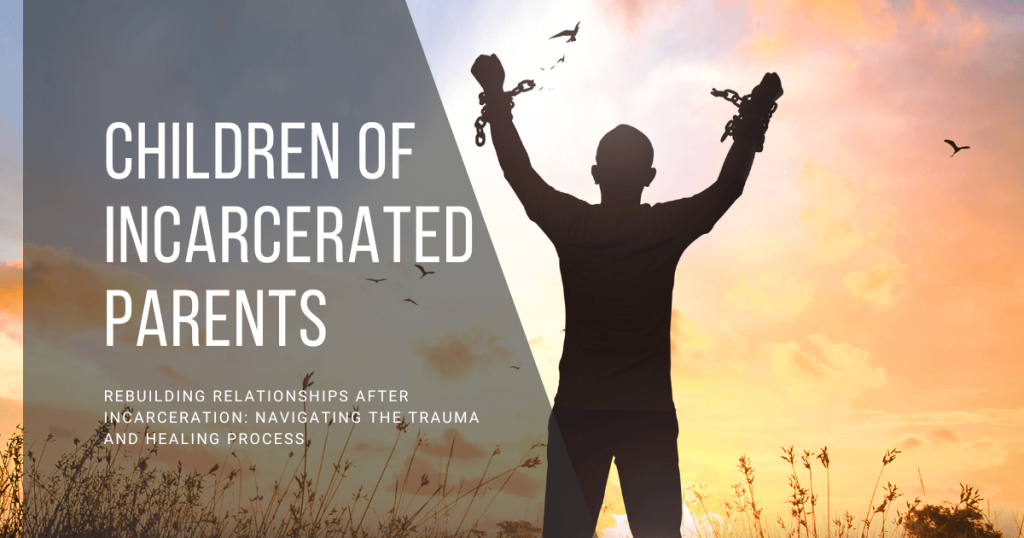This blog post is intended not only for those who have recently reunited with a parent after their release from prison but also for anyone who has experienced the absence of a loved one due to incarceration. The emotions, challenges, and joys that come with rebuilding relationships and navigating the complexities of life after incarceration are universal. Whether you have a sibling, a spouse, a close friend, or any cherished individual who has been incarcerated and is now reintegrating into society, the advice shared here can offer guidance and support. May this post serve as a beacon of hope and understanding for all who have embarked on this transformative journey of reunion and healing.
Keywords: Rebuilding relationship after incarceration, Reuniting with a long-lost parent, Coping with a loved one’s release from prison, Advice for reconnecting with an incarcerated parent, Patience and understanding in post-incarceration relationships, Communicating feelings after a loved one’s release from prison, Embracing joy and playfulness in reestablished bonds, Unconditional love and support for formerly incarcerated individuals, Healing and healing through reintegration after incarceration, Challenges of transitioning after prison release
Father is being Released From Prison
Recently, I had the privilege of witnessing a friend’s joy as his father, who had been incarcerated for nearly two decades, was finally released from prison. As someone who had experienced a similar situation, with my own father having been absent throughout my childhood, I was deeply moved by his emotions. Tears welled up in my eyes as I remembered the overwhelming feelings that accompany the long-awaited reunion with a father who has been absent for so long. Inspired by this heartfelt moment, I felt compelled to share some words of advice that I wish someone had offered me to prepare for the complexities of reestablishing a relationship with a long-lost parent. Here are five invaluable pieces of guidance coming from someone who has walked in his shoes:
Cherish the Memory:
As the initial excitement and honeymoon phase of reuniting with your father slowly fade away, there will come a time when disagreements and conflicts arise. When those moments arrive, hold onto the memories of this extraordinary day, the flood of emotions, and the overwhelming happiness you felt. These cherished memories will serve as a reminder of the love and connection that brought you back together, helping to navigate through the inevitable challenges and strengthening the bond between you.
Patience and Understanding:
After spending years within the confines of the prison system, institutionalized, your father’s perspective, thoughts, actions, and even brain chemistry may have been deeply affected. Some of his behavior or communication might not make immediate sense to you. Exercise patience and understanding as you help him adjust to the ways of the free world. Reconditioning takes time, but with your unwavering support and understanding, he can adapt and find his place in society once again.
Openly Share Your Feelings:
A prolonged absence often leaves behind a trail of unsaid words, assumptions, and suppressed emotions. To build a strong and healthy relationship, it is essential to create a space where both of you can express yourselves freely. Find moments to share your feelings, thoughts, and experiences, allowing your father to do the same. Honest communication will be the foundation upon which your renewed bond is built.
Embrace Joy and Have Fun:
During your father’s absence, you may have longed for moments of carefree playfulness that you missed out on during your childhood. Encourage your father to embrace a sense of joy and childlike wonder in his life as well. Engage in activities that bring out your inner child, revel in the moments of shared laughter, and create cherished memories together. Let the smiles be wide, the laughter be deep, and the bonds be strengthened through the power of play.
Unconditional Love:
Life has dealt your father a challenging hand, and the trauma he has experienced may cause him to struggle with relationships or feel unloved. During these times, it is vital to remind yourself to love him unconditionally. Even when faced with setbacks or difficult moments, be a steadfast source of support, understanding, and compassion. By offering unwavering love, you can help him heal and rebuild his trust in the power of connection.
As I witnessed my friend’s father’s return and reflected on my own experiences, I realized the immense significance of guidance during such a transformative and emotional time. Rebuilding a relationship with a long-lost parent requires patience, understanding, and open communication. It is essential to treasure the memories, support their transition, share your own feelings, embrace joy, and, above all, love unconditionally. Remember, this journey will have its ups and downs, but by following these guiding principles, you can nurture a relationship that blossoms with love, forgiveness, and understanding. May your renewed bond be a testament to the power of hope, healing, and the enduring strength of the human spirit.
The Trauma Impact of Incarceration
The trauma associated with having a parent who is incarcerated is a profound and often overlooked aspect of the experience. For children, the absence of a parent due to incarceration can be emotionally devastating. They may struggle with feelings of abandonment, confusion, and a deep sense of loss. Witnessing their parent’s absence and the stigma surrounding incarceration can lead to shame, guilt, and a range of complex emotions. The instability and disruption caused by the absence of a parent can have long-lasting effects on a child’s emotional well-being, behavior, and overall development.
Moreover, the trauma experienced by the person who is incarcerated themselves cannot be underestimated. Being separated from loved ones, stripped of personal freedom, and confined within the prison system can lead to significant psychological and emotional distress. The harsh environment, isolation, and constant threat of violence in prison can exacerbate existing trauma or create new traumatic experiences. Many individuals who are incarcerated also face additional challenges, such as limited access to resources, education, and rehabilitation programs, which further contribute to their trauma and hinder their reintegration into society.
It is crucial to recognize and address the trauma associated with having a parent who is incarcerated, both for the children and the individuals who are incarcerated themselves. Providing support, therapy, and resources for children and families affected by parental incarceration can help mitigate the long-term impact of trauma. Similarly, offering comprehensive rehabilitative programs within the prison system, focusing on mental health support, and addressing the root causes of that landed them in prison, can aid in the healing process for incarcerated individuals.
By acknowledging the trauma and providing appropriate support, we can work towards breaking the cycle of intergenerational trauma and fostering healing and resilience for both children and individuals who have been incarcerated. Empathy, understanding, and a commitment to addressing the underlying issues that contribute to incarceration are crucial in creating a society that supports the well-being and rehabilitation of all individuals affected by the justice system.







